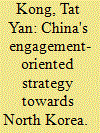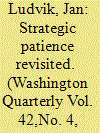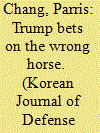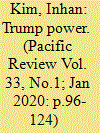|
|
|
Sort Order |
|
|
|
Items / Page
|
|
|
|
|
|
|
| Srl | Item |
| 1 |
ID:
145776


|
|
|
|
|
| Summary/Abstract |
This article investigates the evolution of the European Union (EU)–Russia relationship to understand whether Russia’s violations of Ukraine’s territorial integrity in 2014 destroyed the EU–Russia strategic partnership. It uncovers fundamental differences in three key sectors—security, trade and energy—and regarding the broader design of their contractual relationship. Despite the appearance to the contrary, their relationship was never a well-functioning ‘partnership of choice’. Structural asymmetries contradictory approaches to and fundamentally different understandings of the role and utility of their relationship affected the EU–Russia relationship from the very beginning. The widening gaps were not addressed nor were the differences of the two actors acknowledged, let alone overcome. The confrontation over Ukraine was therefore not the cause but rather a symptom of deeply rooted problems. The blame for talking past each other and engaging in a marriage of convenience, rather than a real partnership, falls on both the EU and the Russian leadership.
|
|
|
|
|
|
|
|
|
|
|
|
|
|
|
|
| 2 |
ID:
160010


|
|
|
|
|
| Summary/Abstract |
In response to the challenge of unstable North Korea (weak economy, weapons of mass destruction [WMD] development), China has followed an engagement-oriented strategy based on diplomatic persuasion, economic interaction and moderate economic sanctions. Intensified engagement (2009–2012) facilitated North Korean convergence with China in respect of economic reform but divergence has persisted over WMD development. Despite the widening of divergence since 2013, China has refrained from applying crippling sanctions. This article seeks to explain these diverging results and their implications for China's strategy towards North Korea. Reviewing recent literature and data, it will argue that Chinese economic input reinforced the trend of economic reform that formed the basis of political consolidation under the new hereditary regime. On the other hand, the prospect of stable dependence on China ran counter to that regime's pursuit of WMDs as the basis of security and diplomatic diversification. These mixed results reveal the limits of China's strategy: its economic input involuntarily reinforces North Korea's WMD potential but it is not prepared to accept the risks of enforcing WMD restraint by crippling sanctions either. With limited room for manoeuvre, the attainment of China's strategic objectives ultimately depends upon policy change from the US or South Korea.
|
|
|
|
|
|
|
|
|
|
|
|
|
|
|
|
| 3 |
ID:
152843


|
|
|
| 4 |
ID:
111527


|
|
|
| 5 |
ID:
152845


|
|
|
| 6 |
ID:
138746


|
|
|
|
|
| Summary/Abstract |
The Obama administration is often criticized for not having a strategic vision. After more than six years in office, a high expectation that was widely shared around the globe seems to have nearly evaporated. Many see the “disorder” the world is facing today as partly a result of a lack of vision from the White House. You could make a case that the emergence of the Islamic State (IS) and other “violent extremism” in the Middle East and beyond, Russia's aggression in Ukraine, chaos in Syria, China's assertive moves in the East China Sea and South China Sea, and so forth, are results, direct and indirect, of a perceived vacuum created by “American withdrawal.” However, the Obama administration's understanding of the world has been surprisingly positive and constant. This paper will argue that Obama administration in fact has a core world view, based on a new self-image of the United States, and that the issue is not whether the administration lacks a vision; rather the focus should be on the vision itself and the execution of that vision.
|
|
|
|
|
|
|
|
|
|
|
|
|
|
|
|
| 7 |
ID:
109221


|
|
|
|
|
| Publication |
2011.
|
| Summary/Abstract |
The Obama administration has been pursuing a policy of "strategic patience" on North Korea, essentially a dual-track policy that keeps engagement open for its good behavior while seeking to impose sanctions for its bad behavior. The strategic patience policy is a clear break with the former Bush administration's robust engagement policy in that it first and foremost demands North Korea's change in behavior before any serious talks or negotiation. But a series of North Korea's provocations since the Obama administration took office in 2009 questioned the validity and effectiveness of the strategic patience policy. It has failed to contain North Korea's increasing nuclear arsenal. In particular, North Korea's intentional disclosure of its uranium enriched program (UEP) and the nation's unusual emphasis on the fallacy of Libya's nuclear abandonment on the heels of the Western allies' recent attack deals a devastating blow to the sustainability of the two-year-old policy, serving as a telling reminder that North Korea has no intention of giving up its nuclear program. This article examines the balance sheet of the strategic patience policy and seeks to present a feasible and realistic solution.
|
|
|
|
|
|
|
|
|
|
|
|
|
|
|
|
| 8 |
ID:
170915


|
|
|
| 9 |
ID:
163853


|
|
|
| 10 |
ID:
156475


|
|
|
|
|
| Summary/Abstract |
North Korea’s pursuit of nuclear arms, and the U.S. effort to stop it, date back to the
1990s. In mid-1994, the United States was ready to use force—to launch a surgical
strike with cruise missiles on the North Korean reprocessing facility at Yongbyon,
which produces plutonium–the material for the nuclear bomb. At the last minute,
North Korea’s leader Kim Il Sung invited former U.S. president Jimmy Carter to
Pyongyang to salvage the crisis. Thereafter, the United States and North Korean
officials met in Geneva and worked out a deal, the Agreed Framework, in December
1994, thereby Pyongyang agreed to suspend its plutonium program, while the
United States, the ROK and Japan would build two light-water reactors for North
Korea to generate electric power. The Americans find North Korean officials
skillful in deception and duplicity, which is rather difficult to deal with. In spite of
their public commitments, the North Koreans are determined to possess nuclear
arms and find ways to continue their quest. They also excel in brinkmanship—they
provoke and make trouble, and then extol concessions/rewards for cooperation.
President Donald Trump, much like his predecessors, erroneously believes that
China is willing and has the economic leverage and political influence to rein in
Pyongyang’s leadership. Hence, Trump has tried to “outsource” North Korea’s
nuclear threat to Chinese leader Xi Jinping in the wake of their summit meeting in
April. Trump has offered a better trade deal to China, but Xi has been reluctant–
to White House officials, Trump’s “bet” is not paying off. As the threat perception
of China and the United States is different, and the interest and agenda of the two
nations in the Asia–Pacific are also vastly different, Xi cannot be expected to do
Trump’s bidding on North Korea. Xi’s primary concern is to prevent U.S. military
attacks on North Korea that would result in the collapse of Kim Jong Un’s regime,
and a pro-U.S. government in North Korea. Nor does Xi want to implement heavy
sanctions on Pyongyang which could destabilize Kim’s regime and drive hundreds
of thousands of refugees into China.
|
|
|
|
|
|
|
|
|
|
|
|
|
|
|
|
| 11 |
ID:
173955


|
|
|
|
|
| Summary/Abstract |
China has started choking off the flow of financial resources entering North Korea by blocking North Korea’s export of natural resources and other industrial products since early 2017. What has pushed Beijing to enforce sanctions strictly, in contrast with its loose administration of sanctions in the past? By employing principal-agent theory, this article shows that Beijing’s conformity to sanctions depends on China’s own need and the degree of pressure from Washington for sanctions enforcement. Until the end of the Obama administration, China did not act meaningfully for sanctions enforcement, as the pressure from Washington was weak and North Korea’s nuclear capabilities remained limited. Now, international contexts have dramatically changed. Beijing feels a need to discipline Pyongyang with sanctions as Pyongyang has become a de facto nuclear weapon state. The new Trump administration in Washington has also pushed Beijing to do more to rein in Pyongyang’s weapon programs.
|
|
|
|
|
|
|
|
|
|
|
|
|
|
|
|
|
|
|
|
|